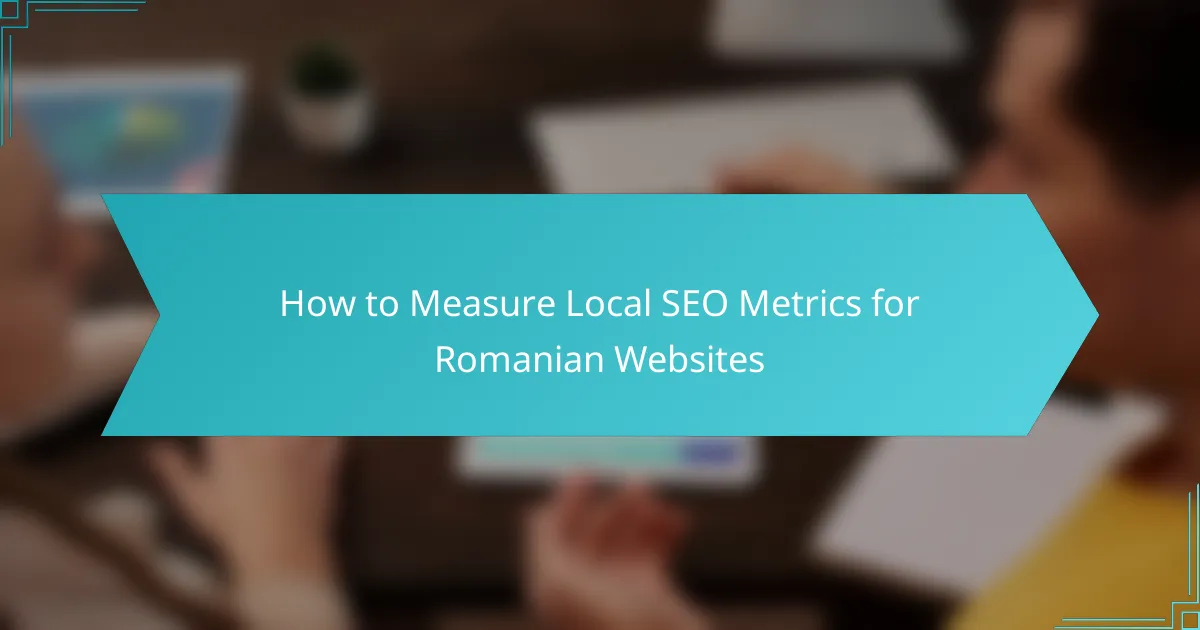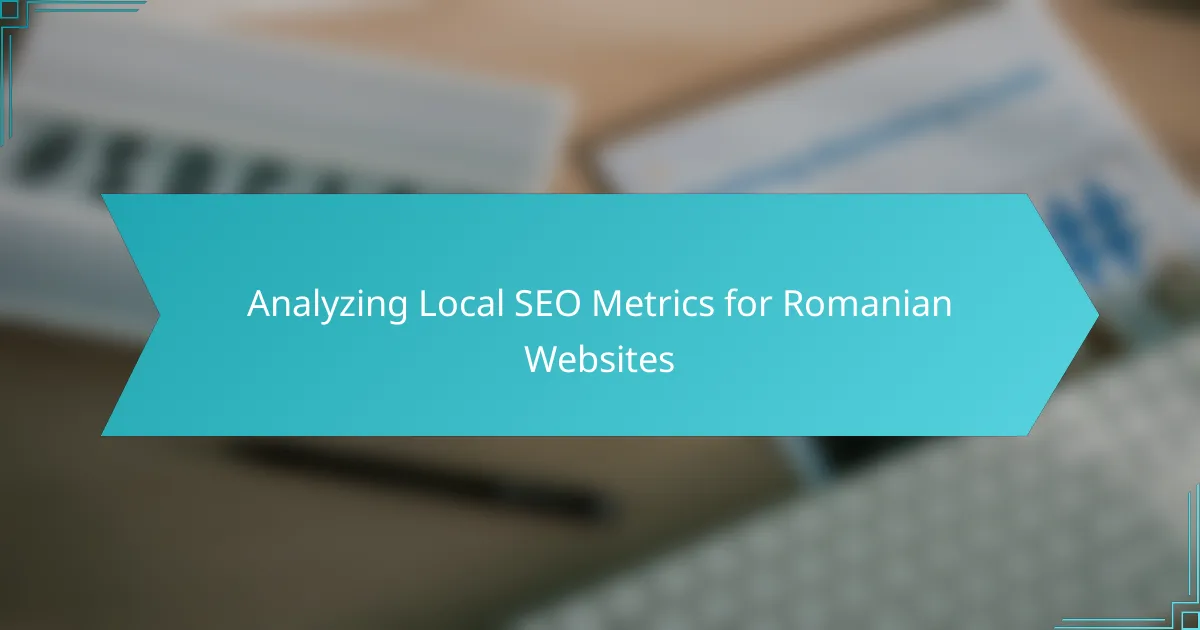Analyzing local SEO metrics for Romanian websites is essential for enhancing online visibility and attracting local customers. By focusing on key metrics such as organic traffic, click-through rates, and conversion rates, businesses can identify strengths and areas for improvement. Utilizing specialized tools allows for a comprehensive understanding of site performance and effective optimization strategies.

How to Measure Local SEO Metrics for Romanian Websites
Measuring local SEO metrics for Romanian websites involves analyzing traffic, keyword rankings, and backlinks to optimize visibility in local search results. By utilizing specific tools, you can gain insights into your site’s performance and identify areas for improvement.
Use Google Analytics for traffic analysis
Google Analytics is essential for tracking traffic to your Romanian website. It provides data on user behavior, including page views, session duration, and bounce rates, which help assess how well your site engages visitors.
To effectively measure local SEO performance, set up goals and conversion tracking to monitor actions such as form submissions or purchases. This allows you to understand how local traffic contributes to your business objectives.
Track local keyword rankings with SEMrush
SEMrush is a powerful tool for tracking local keyword rankings specific to Romania. By entering your target keywords, you can see how your website ranks in local search results compared to competitors.
Focus on keywords that reflect local intent, such as “best restaurants in Bucharest” or “plumbers in Cluj.” Regularly monitoring these rankings helps you adjust your content strategy to improve visibility in local searches.
Analyze local backlinks with Ahrefs
Ahrefs is valuable for analyzing local backlinks, which are crucial for boosting your site’s authority in Romanian search results. By examining your backlink profile, you can identify high-quality local websites linking to you and discover potential link-building opportunities.
Pay attention to the relevance and authority of the sites linking to you. Aim to acquire backlinks from local businesses, directories, and news outlets to enhance your local SEO efforts effectively.

What are the key local SEO metrics to track?
Key local SEO metrics include organic traffic from local searches, click-through rates for local listings, and conversion rates from local visitors. Monitoring these metrics helps businesses understand their online visibility and effectiveness in attracting local customers.
Organic traffic from local searches
Organic traffic from local searches measures how many visitors find your website through search engines when they use location-specific queries. This metric is crucial for assessing the effectiveness of your local SEO strategies.
To improve this traffic, focus on optimizing your website for local keywords, creating location-specific content, and ensuring your Google My Business profile is complete and accurate. Aim for a steady increase in organic traffic over time, ideally in the range of 20-30% growth annually.
Click-through rate (CTR) for local listings
Click-through rate (CTR) for local listings indicates the percentage of users who click on your business listing after seeing it in search results. A higher CTR suggests that your listing is appealing and relevant to local searchers.
To enhance your CTR, ensure your titles and descriptions are engaging and include local keywords. Regularly update your listings with fresh information and attractive images. A good CTR for local listings typically falls between 5-10%, but striving for higher rates is beneficial.
Conversion rates from local visitors
Conversion rates from local visitors reflect the percentage of users who complete a desired action, such as making a purchase or filling out a contact form, after visiting your site. This metric is vital for evaluating the effectiveness of your local SEO efforts in driving business results.
To boost conversion rates, optimize your website’s user experience, ensure fast loading times, and provide clear calls to action. Local businesses often see conversion rates ranging from 2-5%, but improving this figure can significantly impact revenue.

How to improve local SEO performance in Romania?
Improving local SEO performance in Romania involves optimizing your online presence to attract local customers effectively. Key strategies include enhancing your Google My Business profile, creating relevant local content, and building citations and backlinks from local sources.
Optimize Google My Business profile
To enhance your local SEO, start by claiming and optimizing your Google My Business (GMB) profile. Ensure that all information, including your business name, address, phone number, and operating hours, is accurate and consistent across platforms.
Utilize high-quality images and encourage customers to leave reviews, as these factors significantly influence local search rankings. Responding to reviews can also improve customer engagement and trust.
Enhance local content marketing strategies
Creating localized content is essential for attracting Romanian customers. Focus on topics relevant to your community, such as local events, news, or customer stories that resonate with your audience.
Incorporate local keywords naturally into your website and blog posts. This can improve your visibility in search results and help potential customers find your business more easily.
Build local citations and backlinks
Local citations and backlinks from reputable Romanian websites can boost your local SEO. Start by listing your business in local directories and industry-specific sites, ensuring consistency in your NAP (Name, Address, Phone number).
Additionally, seek opportunities for guest blogging or partnerships with local businesses to earn backlinks. This not only improves your SEO but also enhances your credibility within the community.

What tools can help analyze local SEO in Romania?
Several tools can effectively analyze local SEO for Romanian websites, focusing on performance, audits, and citation management. Utilizing these tools can enhance visibility in local search results and improve overall online presence.
Google Search Console for performance insights
Google Search Console is essential for monitoring website performance in local search results. It provides data on search queries, click-through rates, and impressions, allowing you to identify which keywords are driving traffic to your site.
To leverage this tool, regularly check the Performance report for insights into local search terms relevant to your business. Pay attention to geographic data to understand how users in Romania are interacting with your site.
BrightLocal for local SEO audits
BrightLocal specializes in local SEO audits, offering comprehensive reports on your website’s local search performance. It evaluates factors such as local rankings, citation accuracy, and online reviews, which are crucial for improving local visibility.
Using BrightLocal, you can track your rankings for specific keywords in Romania and compare them against competitors. This tool also helps identify areas for improvement, such as enhancing your Google My Business profile or correcting citation discrepancies.
Moz Local for citation management
Moz Local focuses on managing online citations, ensuring your business information is consistent across various directories. Accurate citations are vital for local SEO, as they help search engines validate your business’s legitimacy.
With Moz Local, you can monitor your citations and receive alerts for any inconsistencies. This tool also assists in submitting your business information to multiple platforms, which is essential for maintaining a strong local presence in Romania.

What are the common challenges in local SEO for Romanian websites?
Romanian websites face several challenges in local SEO, primarily due to competition, evolving algorithms, and the need to manage online reputations. Addressing these issues is crucial for improving visibility and attracting local customers.
High competition in urban areas
Urban areas in Romania, such as Bucharest and Cluj-Napoca, often have high competition among local businesses. This saturation makes it essential for websites to differentiate themselves through targeted keywords and unique value propositions.
To stand out, businesses should focus on niche markets or specific services that cater to local needs. Utilizing local landmarks or cultural references in content can also enhance relevance and engagement.
Keeping up with algorithm changes
Search engines frequently update their algorithms, which can impact local SEO rankings. Romanian website owners must stay informed about these changes to maintain or improve their visibility in search results.
Regularly reviewing SEO best practices and adapting strategies accordingly is vital. Tools like Google Search Console can help track performance and identify areas needing adjustment in response to algorithm updates.
Managing online reviews and reputation
Online reviews significantly influence local SEO and consumer trust. Romanian businesses should actively encourage satisfied customers to leave positive reviews while addressing negative feedback promptly and professionally.
Establishing a review management strategy can help maintain a positive online reputation. This includes monitoring platforms like Google My Business and social media, responding to reviews, and using feedback to improve services.

How does local SEO differ from general SEO?
Local SEO focuses on optimizing a website to attract traffic from local searches, while general SEO targets a broader audience. This means that local SEO strategies include specific practices to improve visibility in local search results, such as Google Maps and local business listings.
Focus on local search intent
Understanding local search intent is crucial for effective local SEO. This involves recognizing that users often search for services or products within a specific geographic area, indicating a desire for immediate or nearby solutions. For example, a search for “best pizza near me” shows a clear local intent.
To optimize for local search intent, businesses should incorporate location-based keywords into their content, such as city names or neighborhood identifiers. This helps search engines understand the relevance of the website to local queries. Additionally, creating content that addresses local events or news can enhance engagement with the community.
Common pitfalls include neglecting to update local listings or failing to respond to customer reviews. Businesses should regularly check their online presence on platforms like Google My Business and ensure that all information is accurate and up-to-date.
